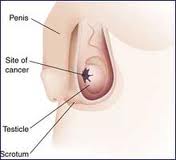Testicular cancer is cancer that starts in the testicles, the male reproductive glands located in the scrotum. The treatment for testicular cancer may include lymph node dissection, chemotherapy and radiation therapy.
However, not all cases have positive results after using treatment for testicular cancer. A number of studies found that many men who undergo treatment for testicular cancer suffer serious and long-term side effects or illness.
Treatment for testicular cancer leads to both long-term and short-term side effects. But rarely long-term side effects are informed to patients. The cause of the fact may lie in the fact in the past, doctors are only required to report side effects that require medical intervention or threaten the patient’s life, so the rate of long-term side effects has not been well known.
The statistics from 40 studies published between 1990 and 2008 reveals a full 30 percent of patients undergoing cisplatin-based chemotherapy may suffer from damage to their sensory nerves while the state of hearing loss or ringing in ears affects 20 percent of testicular cancer survivors. 17 percent of survivors suffer from chronic fatigue, twice as high as in the general population. The rate of suffer from long-term damage to their circulatory systems is 25 percent. And the general risk of developing another form of cancer in survivors is 1.8 times.
In addition, gastrointestinal side-effects also occur common during both chemotherapy and radiotherapy, which increases the risk of infection and blood clots.
Especially, secondary cancers, heart problems, and conditions related to lower hormone levels are serious risks of testicular cancer treatments. Pulmonary complications, death from heart complications, fertility reduction and dry ejaculation are also dangerous-side effects.
To reduce these risks, the patients are recommended to maintain an active lifestyle and healthy weight and avoid tobacco for whole life, not just for five to 10 years of follow-up care as most do.

